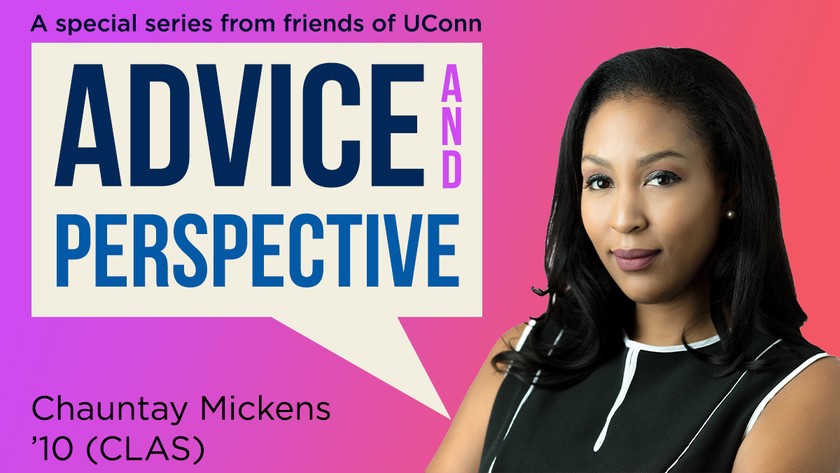
Over the summer, as part of the “Advice and Perspective” series, the Center for Career Development invited UConn alumni to share advice and lessons that they have learned since graduating college. In “How I Built Professional Wealth During and After College”, Chauntay Mickens talks about her career journey thus far and why she believes building professional wealth early on in your career is important. The video recording of the event can be found below:
Chauntay Mickens completed her undergraduate work at the University of Connecticut in 2010, where she majored in Sociology and African American Studies. After graduating, she moved back home to Washington, DC and began working within the non-profit sector. She attended Georgetown University to get her Masters degree and currently works for a non-profit organization which seeks to empower Black, Native American, and Latinx individuals and help bridge the wealth gap for these minority groups.
Mickens begins her discussion of professional wealth by talking about the importance of planning after you graduate. Student loan debt is an ongoing issue for many individuals in her generation and the generations that follow, and she says that it is important to structure a plan after you graduate for how you will pay that off while simultaneously building generational wealth. She also stresses the importance of knowing the value of your college degree. If you have a college education, use that to your benefit and find employment opportunities that value your degree and provide you with opportunities for economic mobility.
Looking back on her college career, Mickens mentions that the concept of “finding yourself” in college is a myth when it comes to career. While many individuals recall “finding themselves” in college on a personal level, many people don’t know exactly what they want to do with their career and it can be stressful trying to navigate your career path while attending school full-time. In order to combat this stress, Mickens recommends a planning approach- think about what kinds of things you can see yourself doing for the rest of your life, talk to people who work in certain fields and get an idea of what their job is, and do some of your own research as early on in your college career as possible to kick-start that planning process.
Another myth that Mickens mentions is the notion that hard work always leads to success. She says that is not always the case; in order to build professional wealth, you have to market yourself well and build connections with your peers and find mentors that you can rely on when you are looking for opportunities for growth. Chauntay even mentions that during her final year of her undergraduate studies, she would reach out to professors and ask to grab coffee and talk about their career paths and potential opportunities for her to undertake.
Mickens ends her talk with emphasizing the importance of starting early when navigating your career journey. She reminds everyone that UConn is a great university with so many resources available for students, and it is so valuable to use the career resources at your disposal. Reach out to people you know, research how to achieve your career goals, and utilize the Center for Career Development.
If you are interested in learning more about how to build professional wealth, consider scheduling an appointment with a Career Coach at the Center for Career Development! Career Coaches can provide you with more insight into the importance of professional development and how to navigate your career path!
